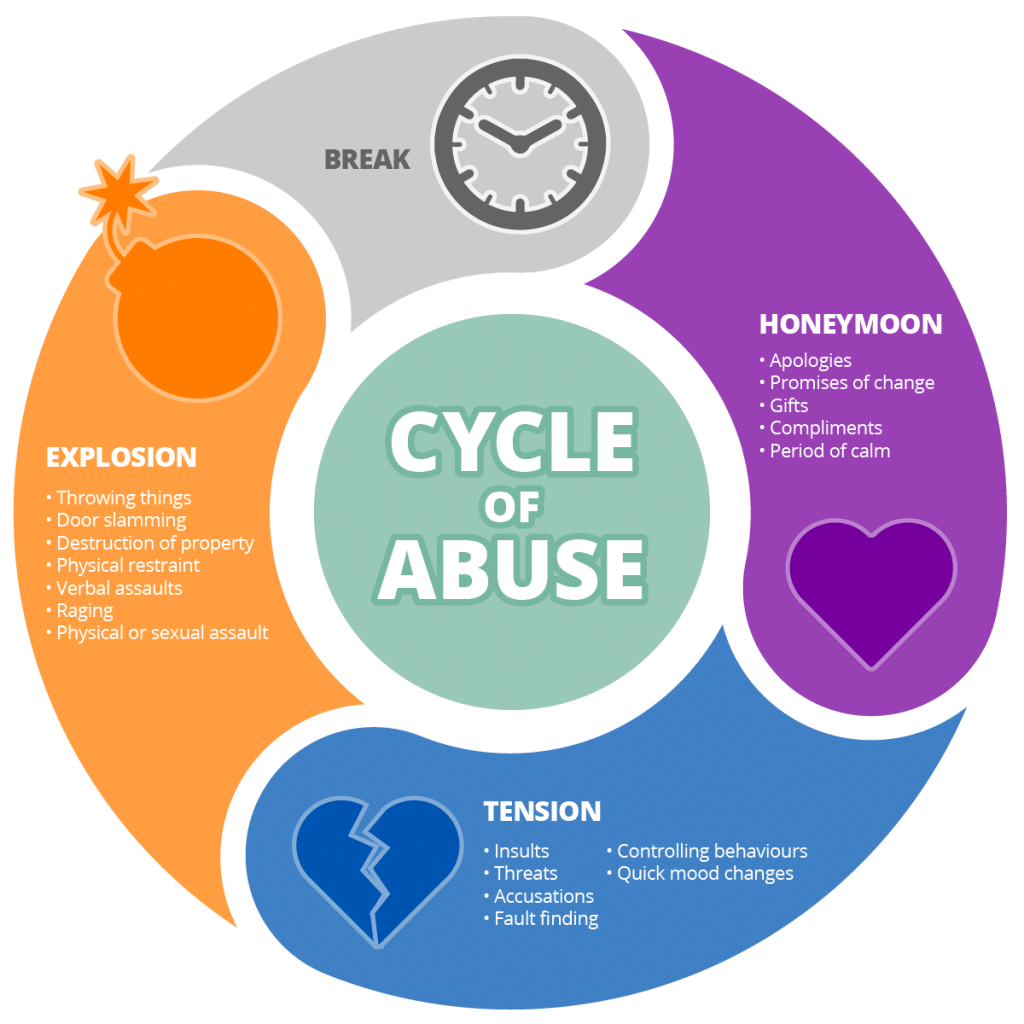Click here to navigate away from this page quickly.
Because IPV tends to happen behind closed doors, there may not necessarily be signs visible to people outside the immediate household. Survivors are often highly successful and effective individuals who have learned how to put on a good face, and may not disclose the abuse to anyone.
Becoming familiar with the Cycle of Abuse, which outlines the pattern of how violence escalates and explodes, and the possible signs of abuse, including concussion, are good ways to become more aware.
Possible Signs of Physical Abuse (Suspected Abuse Tool) (Bass et al., 2001)
- Bruises, welts, cuts, or wounds, cigarette or rope burn marks, or blood on person/clothes.
- Internal injuries, including broken or fractured bones, sprains, or muscle injuries.
- Painful body movements, such as limping, trouble sitting/standing (not illness related).
- Coded or vague/indirect references to sexual assault or unwanted sexual advances.
Possible Signs of Psychological Abuse (Bass et al., 2001)
- Sense of resignation and hopelessness with vague references to mistreatment.
- Behavior that is passive, helpless, withdrawn
- Anxious, trembling, clinging, fearful, scared of someone/something.
- Self-blame for current situation or partner/caregiver behavior.
- Excuses constantly made for partner’s moods or behaviours.
Possible Signs of Neglect by Others or Self (Bass et al., 2001)
- Unclean physical appearance.
- Inadequate food or meal preparation supplies in household.
- Underweight, physically frail or weak, or dehydrated.
- Under or overuse of, or confusion about, prescription, or over-the-counter, medications.
- Inadequate utilities, including lack of heat, water, electricity, and toilet facilities.
- Unsafe or unclean environment, including insect infestation, or unmaintained animals.
- Neglected household finances, including unpaid bills or rent.
Possible Signs of Exploitation (Bass et al., 2001)
- Overpayment for goods or services
- Unexplained changes in power of attorney, wills, or other legal documents.
- Missing personal belongings.
- Lack of access to personal or family finances.
Possible Signs and Symptoms of Concussion/Traumatic Brain Injury
- Seeing the person hold their head.
- Lack of coordination.
- Appearing dazed and confused.
- Headaches.
- Blurry or spotty vision.
- Seeing stars.
- Ringing in the ears.
- Being sensitive to light or noise.
- Feeling nauseated or sick to their stomach.
- Dizziness.
- Balance problems.
- Feeling tired or fatigued.
- Problems falling asleep, staying asleep, or sleeping too much/little.
NOTE: Symptoms of concussion can be delayed for up to two days after the incident occurs. Loss of consciousness is only seen in about 10% of cases.
Learn more about how to support survivors of IPV and recognize brain injury in the CATT course for Women’s Support Workers.
